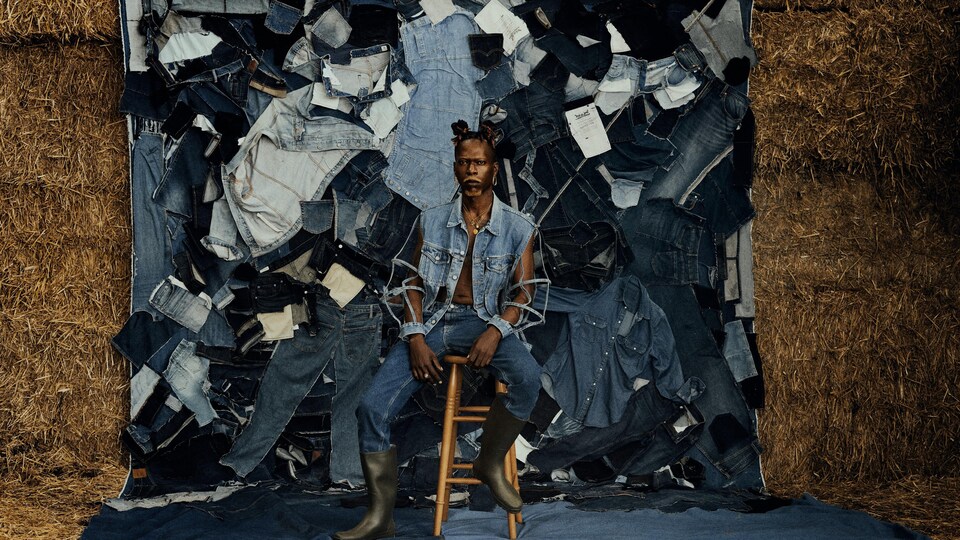Ambitious mural on love and romance, José Louis and the Paradox of Love Pierre Kwenders ’third album consists In this opus recorded in four corners of the globe in five different languages, the singer continues his mixing of styles with a ton of collaborators like Win Butler, of the Arcade Fire group.
If the title of Pierre Kwenders ’new album is to be taken from his real name, José Louis Modabi, it is no coincidence according to the artist who believes it is probably his most well-known work.
This is a very personal album where I really opened up and where I was most vulnerable. I told the story of José Louis, certainly through the voice of Pierre Kwenders, but it was really José Louis who lived through all these stories of love and these experiences.explanation by the artist, accompanied by a videoconference.
Reflecting first on the contradictions of love, this new opus is also full of references to the past, whether in Montreal, Democratic Republic of Congo (DRC) where the singer was born, or in one of many country he went to. The question of heritage – what he received and what he will leave – is once again central to the artist’s strategy.
Note that his name on stage, Pierre Kwenders, is a tribute to his maternal grandfather with the same name. On his third album, he makes other nods to his family, as in Your Dreamstarting with a voicemail from his mother.
This is a message that my mother left me when I was 34. I wanted to write a song for her, because sometimes our parents doubt our choices in life, they wonder who we really are.explains Kwenders, who left a comfortable accounting job nearly six years ago to devote himself to his music career. Through this song, I want to give her reassurance and thank her at the same time for her love.
Love in all its forms has strongly influenced these 13 new titles. I grew up, I understood a lot. I quote James A. Baldwin, who said: “Love is a battle, love is a war; love is a growing up”. It was a little love that raised mesummary of the singer.
Congolese rumba as a pillar of an eclectic style
From his first album, The last emperor of Bantu (2014), Congolese rumba occupies an important place in Pierre Kwenders ’musical universe. This is always the case with José Louis and the Paradox of Love.
The first single from the album, Papa Wembais also a tribute to a so -called the king of Congolese rumba : Congolese singer and actor Papa Wemba. This artist, who died in 2016, was a major inspiration for Kwenders, who from a young age saw him open the borders for artists from the DRC.
Congolese rumba is really the guiding soul of the album, it’s really what rocks me when I compose, so it’s omnipresent in what I doKwenders explained. But we hear it all: rap, R’N’B, jazz.
These influences are woven by the electronic sounds envisioned by Kwenders and his acolytes. Whether in terms of production, music or vocals, the album is full of collaborations, most of them with international artists like Ngabo, Sônge, anaiis, Babel Bukasa, Uproot Andy and Branko.
What matters is teamwork. This is what drives what I do. I feel a bit isolated from working alone, but working with others enriches me.explained Pierre Kwenders.
Love does not sleep on dance floor
LES (Freedom Equality Sagacity), the first track of the album close to the 10 minute mark, sets the tone of the album. Pierre Kwenders recites the mantra over and over freedom, equality, intelligence in an intoxicating electro frame signed by King Britt. Win Butler and Régine Chassagne, co-founding couple of Arcade Fire, participated in the voice and on the synthesizers.
Pierre Kwenders met his friend Win Butler in New Orleans, Louisiana, where Arcade Fire recorded the music video for his new single, The Lightning I, II. It was one of many places where Kwenders ’album was recorded, between Lisbon in Portugal, Seattle in the United States, Santiago in Chile and Montreal.
Like the first two opuses of Kwenders, José Louis and the Paradox of Love is designed for the dance floor, while exposing the softer side of the artist. Pieces with a higher tempo (Papa Wemba, Cut, Kilimanjaro) along with slower songs where the artist takes the time to set the mood (Your Dream, heartbeat).
Along with launching shows for his album, on May 4 in Toronto, at The Music Gallery, and on May 6 in Montreal, at the Phi Center, Pierre Kwenders continues to make his Moonshine concept travel anywhere.
These musical nights that he oversees as a DJ have really had a huge importance since they started in the venues. underground from Montreal, with events in Lisbon, Paris, London, Los Angeles and more. In the words of José Louis Modabi, alias Pierre Kwenders, love does not sleep on dance floor.
Source: Radio-Canada
